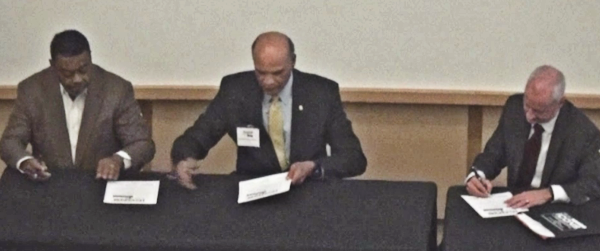JSNN, DEVCOM Soldier Center Partner to Enhance Nanoscale
Materials for Soldier Protection
Jamie Crocket
 |
|
Franklin D. Gilliam Jr. UNCG & Harold
L. Martin, Sr. NCA&T Michael Rettie |
EAST GREENSBORO, N.C. (Nov. 21, 2022) – A new partnership between
the U.S. Army Combat Capabilities Development (DEVCOM) Soldier
Center and the Joint School of Nanoscience and Nanoengineering at
Gateway Research Park will develop advanced nanoscale materials for
soldier protection that promise to be lighter, faster, safer and
stronger than ever before.
Officials with DEVCOM, the Joint School, its two academic parents,
North Carolina Agricultural and Technical State University and the
University of North Carolina Greensboro (UNCG), and federal and
state government announced the new development at a Nov. 21 media
availability on the Gateway campus.
The Innovative Collaborative Laboratory for Nanotechnologies to
Empower Future Soldier (ICONS), initiated by a $1.05-million
cooperative agreement from the DEVCOM Soldier Center, is the only
collaborative lab of its kind in North Carolina and the first
established with a historically Black college or university (HBCU)
or minority-serving institution anywhere in the nation. ICONS will
be co-led by two JSNN professors, Kristen Dellinger, Ph.D., in the
Department of Nanoengineering at N.C. A&T, and Tetyana Ignatova,
Ph.D., in UNCG’s Department of Nanoscience.
“This is a unique opportunity for JSNN’s students to engage in
collaborative research that advances the technologies needed to
support soldiers and other military-relevant applications,” said
Sherine Obare, Ph.D., JSNN dean. “And with JSNN’s proximity to
several North Carolina military bases, our researchers can directly
connect with military personnel and veterans to understand the needs
of soldiers to develop solutions from the users’ perspective.”
ICONS will focus on the research and development of sustainable
material solutions for the “Future Enabled, Invisible, Sustained and
Enhanced Soldier.” Research teams will produce nanomaterials that
can be integrated into yarn and woven fabric clothing for soldiers
and used as additives for helmets and other protective devices.
ICONS will also utilize JSNN’s nanodevice fabrication facilities to
design and build highly sensitive and selective sensors to detect
various chemical hazards.
“The rich history of N.C. A&T and UNCG and JSNN’s unique ability to
produce a diverse cadre of students with transdisciplinary training
spanning science and engineering, who are prepared to develop
technologies to protect soldiers on the battlefield, aligns with our
mission, and we look forward to a long-lasting partnership,” said
Douglas Tamilio, director of the DEVCOM Soldier Center.
“We are excited to partner with two outstanding universities in N.C.
A&T and UNC Greensboro, and their combined research and teaching
strengths through JSNN,” said Ramanathan Nagarajan, the Army’s
senior research scientist for Soldier Nanomaterials. “ICONS provides
access to a diverse pool of S&T talent with the training and
expertise needed to develop innovative materials breakthroughs to
empower the Future Soldiers.”
About JSNN
The Joint School of Nanoscience and Nanoengineering (JSNN) is an
academic collaboration between North Carolina Agricultural and
Technical State University (N.C. A&T) and The University of North
Carolina Greensboro (UNC Greensboro). A $56.3 million, 105,000
square foot state-of-the-art science and engineering research
facility, JSNN builds on the strengths of each institution to offer
innovative, cross-disciplinary graduate programs in the emerging
areas of nanoscience and nanoengineering. JSNN’s research focus
areas include: Synthetic Biology, Nanomaterials: Molecular
Structures and Devices, Computational Nanotechnology, and
Environmental Science and Sustainability. JSNN’s mission is to be a
catalyst for breakthrough innovations that provides high-impact
academic, industry and government research outcomes.
About DEVCOM Soldier Center
The DEVCOM Soldier Center, located in Natick, MA, is committed to
discovering, developing and advancing science and technology
solutions that ensure America’s warfighters are optimized,
protected, and lethal. DEVCOM Soldier Center supports all of the
Army’s Modernization efforts, with the Soldier lethality and
Synthetic Training Environment Cross Functional Teams being the
DEVCOM Soldier Center’s chief areas of focus. The center’s science
and engineering expertise are combined with collaborations with
industry, DOD, and academia to advance soldier and squad
performance. The center supports the Army as it transforms from
being adaptive to driving innovation to support a multi-domain
Operations Capable Force of 2028 and a MDO Ready Force of 2035.
DEVCOM Soldier Center is constantly working to strengthen Soldier’s
performance to increase readiness and support warfighters who are
organized, trained, and equipped for prompt and sustainable ground
combat. STEM (Science, Technology, Engineering and Math) outreach
and mentoring the next generation of scientists and engineers is an
important part of the mission of DEVCOM Soldier Center. The
mentoring of students by Army scientists and engineers benefits the
students and their communities. It also increases young people’s
awareness of potential Army job opportunities and helps provide the
Army with potential new talent, helping to fuel innovative ideas
that benefit the nation’s warfighters and the nation as a whole.
About North Carolina A&T State University
North Carolina Agricultural and Technical State University is the
nation’s largest historically Black university, as well as its top
ranked (Money magazine, Best Colleges). It is a land-grant, doctoral
university, classified as “high research” by the Carnegie Foundation
and a constituent member of the University of North Carolina System.
A&T is known for its leadership in producing graduates in
engineering, agriculture and other STEM fields. The university was
founded in 1891 and is located in Greensboro, North Carolina. |